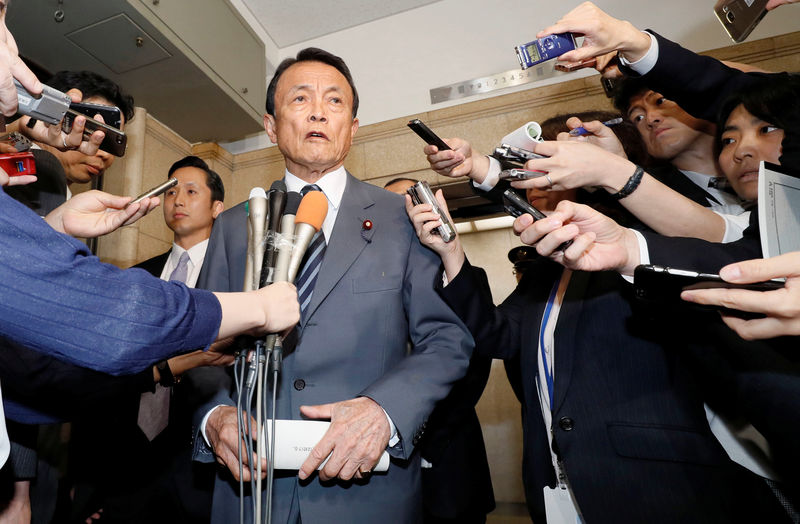TOKYO (Reuters) - Japan's top finance bureaucrat resigned on Wednesday after a weekly magazine said he had sexually harassed several female reporters, the latest blow for Prime Minister Shinzo Abe whose ratings have been hit by a series of scandals.
Finance Minister Taro Aso told reporters that he had accepted Administrative Vice Finance Minister Junichi Fukuda's resignation.
It is the latest in a number of headaches for Aso and Abe. A steady trickle of allegations about suspected cronyism and cover-ups has raised doubts about how long Abe can stay in power.
Fukuda denies the allegations against him but told reporters he resigned because he could not further disrupt work at the ministry. He said he still intended to sue the magazine, Shincho.
"I am to blame for causing the media report about myself while the finance ministry faces a severe situation," he said.
"Given that the situation after the report has made it difficult for me to fulfil my duty as administrative vice minister, I tendered my resignation to finance minister Aso just now."
He added that he did not recall having the "terrible conversation" reported in the magazine.
Japan has had few reported "#MeToo" cases about sexual harassment involving public figures. Victims are often reluctant to speak out for fear of being blamed. The identity of the female reporters in Fukuda's case has not been disclosed.
The Finance Ministry said in a statement on Tuesday that it would continue to investigate the allegations surrounding Fukuda through an external law firm, given that the initial internal fact-finding had been conducted by Fukuda's subordinate.
It called on female reporters to come forward and contact the law firm if they were willing to cooperate with the investigation, drawing fire from several cabinet ministers including Seiko Noda, one of only two women in the cabinet.
Fukuda's resignation came just after the governor of Niigata prefecture, home to the world's largest nuclear power plant, resigned over an impending magazine article about his relations with women.
Ryuichi Yoneyama, who is single, said some of the money and presents he gave women he dated could be open to misinterpretation and that he was resigning to avoid further political "turmoil".
While Abe has made his "Womenomics" programmes to mobilise women in the workforce part of his policies to boost growth, big gender gaps persist at companies and in politics.

Abe is currently in the United States for talks with U.S. President Donald Trump, and Aso is set to leave on Thursday for an international meeting of finance ministers and central bank governors in Washington D.C.